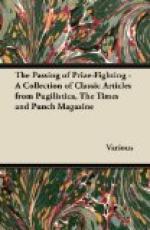I have, the Baron says, commenced the first pages of The Last Days of Palmyra. Good, so far; but several new books have come in, and Palmyra cannot receive my undivided attention, says
THE BARON DE BOOK-WORMS.
P.S.—My faithful “Co.” has been reading Ferrers Court, by JOHN STRANGE WINTER, author of Bootle’s Baby and a number of other novelettes of like kind. He says that he is getting just the least bit tired of Mignon, and the plain-spoken girls, and the rest of them. By the way, he observes that it seems to be the fashion, judging from the pages of Ferrers Court, in what he may call “Service Suckles,” to talk continually of a largely advertising lady’s tailor. If this custom spreads, he presumes that the popular topic of conversation, the weather, will have to give place to the prior claims for consideration of Somebody’s Blacking, or Somebody-else’s Soap. This is to be regretted, as, in spite of the sameness of subject of the Bootle’s Baby series, JOHN STRANGE WINTER is always more amusing than nine-tenths of his (or should it be her?) contemporaries. B. De B.-W. & Co.
P.S. No. 2.—The Baron wishes to add that on taking up the Bride of Lammermoor in order to refresh his memory before seeing the new drama, he was struck by a few lines in the description of Lucy Ashton, which, during rehearsals, must have been peculiarly appropriate to her representative at the Lyceum, Miss ELLEN TERRY. Here they are:—“To these details, however trivial, Lucy lent patient and not indifferent attention. They moved and interested Henry, and that was enough to secure her ear.” “Great Scott!” indeed! Perfectly prophetic, and prophetically perfect. B. DE B.-W.




